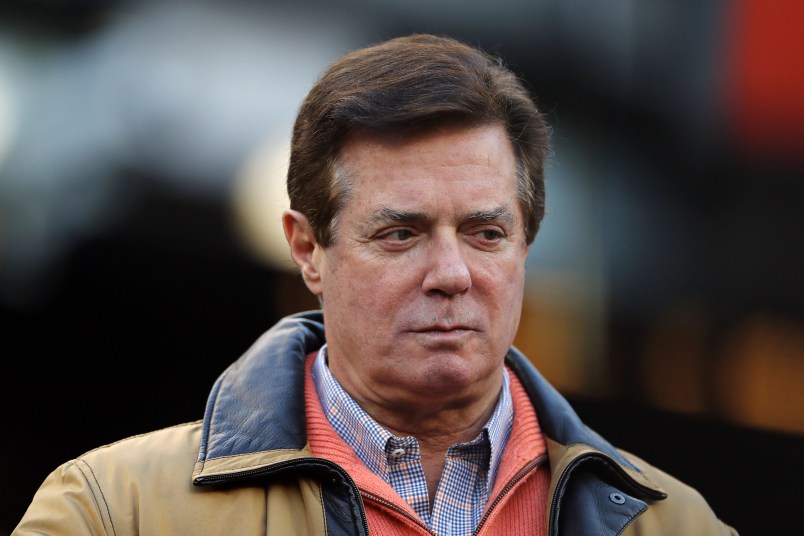Prosecutors rested their case against former Trump campaign chairman Paul Manafort Monday afternoon.
The prosecution concluded its case-in-chief against the former high-flying, high-living lobbyist and political consultant after 10 days of testimony from dozens of witnesses.
It is not yet clear whether Manafort’s defense team intends to call witnesses in his defense, but the jury is likely to begin deliberations in the case this week.
Manafort has pleaded not guilty to bank fraud and tax fraud charges arising from his consulting work in Ukraine. His prosecution by special counsel Robert Mueller is the first trial in the sprawling probe of Russia meddling in the 2016 elections, though Manafort was not charged with anything directly related to Russia or its election interference.
After the prosecution rested, Manafort’s lawyers moved for acquittal on all charges. But they were especially focused on the bank fraud charges, arguing that the bank did not rely on Manafort’s representations when making the loans in question. They also said they intended to argue that the prosecution had failed to prove willfulness on the tax fraud charges.
The prosecutors informed U.S. District Judge T.S. Ellis that they had filed a brief addressing the defense’s move to throw out the charges, and Manafort’s attorneys said they too planned to file briefs. So the judge indicated that he would rule on that issue tomorrow. Additionally, the judge announced that he would hold a closed hearing — meaning not open to the public — on a matter that remains under seal. It is not clear if that matter, where sealed briefs have been filed, is related to the extended delays in the proceedings on Friday.
The train of prosecution witnesses over the past two weeks laid out in painstaking and often plodding detail the myriad financial transactions by which Manafort allegedly avoided U.S. income taxes. The witnesses included other consultants who worked with Manafort in Ukraine, high-end vendors who were paid with wire transfers from Manafort’s foreign accounts, employees at the banks were he allegedly sought fraudulent loans, and his bookkeeper and accountants, who described his involvement in the representations made on his tax forms. Together, their testimony created a narrative arc of a man who for half a decade allegedly hid from the government a significant share his income until that work dried up and then misled banks for loans that would enable him to maintain his lavish lifestyle.
To poke holes in that narrative, the defense sought to shift the blame to his associates while suggesting that Manafort was a man too busy to worry about the details of his financial transactions.
The dry, transactional details were punctuated by the dramatic testimony last week of Manafort’s former protege, Rick Gates, who was initially charged along with Manafort before flipping and agreeing to cooperate with prosecutors.
Over the course of several days last week, Gates testified he conducted “criminal activity” by helping his former boss hide his foreign income and submit misleading financial information to lenders. He also admitted to stealing money from Manafort, a charge that was not included in the indictment against Gates. During his testimony, Gates described the specific ways he went about hiding information from Manafort’s bookkeeper and accountant and handing over inflated income information to banks considering loans, but his testimony was at times emotional as well. During cross examination, Gates said that he regrets his past actions and is “taking responsibility for it.” Faced with an accusation from lead defense attorney Kevin Downing that he led a “secret life” with more than one affair, Gates said, “I made many mistakes over several years.”
President Trump’s name went largely unuttered during the trial, until its final leg, which focused on a loan Manafort received from a banker who advised Trump’s campaign and whom Manafort allegedly promised a position in his administration. Despite the lack of focus on Trump, or Russia’s 2016 meddling more generally, the trial represents a major test for Mueller, whose investigation has been smeared as a “witch hunt” by the President.
The prosecutors faced repeated badgering by Judge Ellis, a 78-year-old with a flair for theatrics and willingness to insert himself in the proceedings. On one occasion, Ellis gave the prosecutors a mea culpa in front of the jury for going too far in his criticisms of the government lawyers. But he continued to cut off prosecutors’ lines of inquiry, scold them for spending too much time with witnesses on topics he did not think were relevant, and intervening with questions generally favorable to the defense’s posture in the case.
Manafort has arrived to court every day in a simple suit with a serious look on his face. Since he landed in jail, his gray roots have begun showing through his former dye job, but he otherwise appears the same. He’s seen flashing the occasional smile at his lawyers or wife, but remains serious and stone-faced during witness testimony, often reviewing documents with his reading glasses on.







I wish I had faith in this jury, but since November 8, 2016, I don’t have faith in humanity whatsoever.
Justice is a thing sadly lacking these days. Let us hope that when the jury goes out to deliberate, Manafort gets justice, and remains behind bars for the rest of his life (or at least until Trump pardons him).
Has Judge Cranky told the defense yet that they don’t need to present their side?
Is there someone with expertise who could provide thoughts on the merits of the prosecution? I’m a layman, and it seems straightforward and demonstrative.
Ummm…doesn’t that timing depend on the defense calling witnesses?